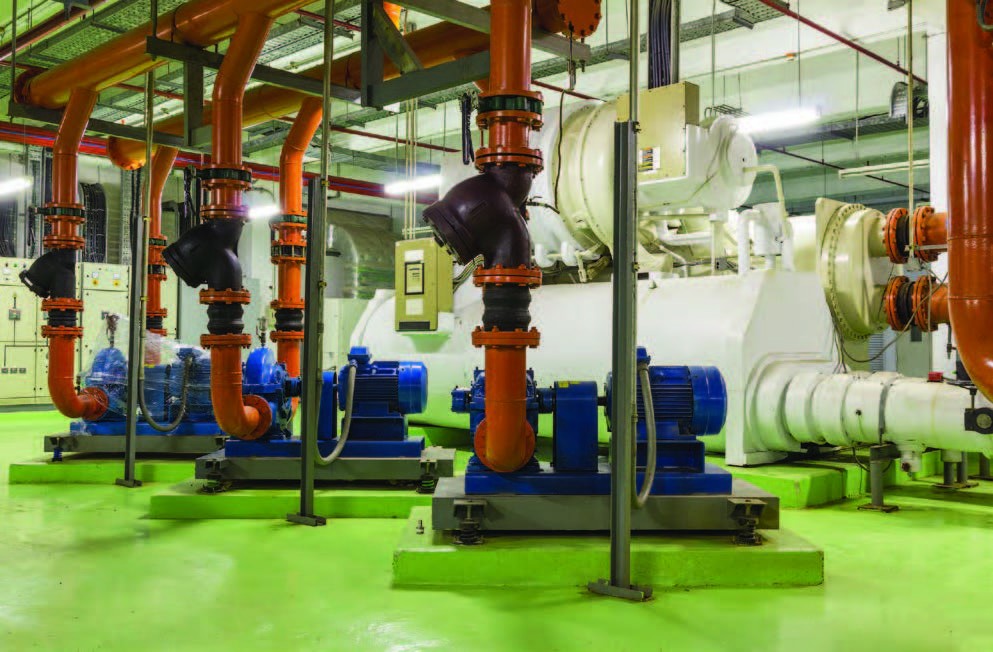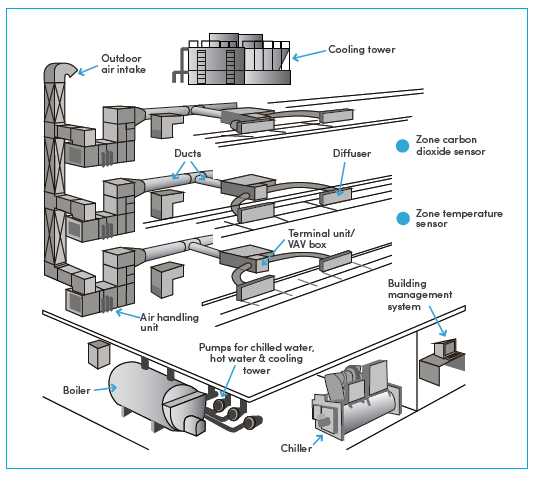Data Analysis Maximises HVAC Lifecycle
HVAC data analysis: optimising the benefits
So your HVAC system is running well – no breakdowns, really reliable – but is that the whole story? It's easy to become complacent when things are going well, but it is not wise to let your valuable equipment run without data collection and analysis. Our bodies need check-ups and regular tests of blood, which can reveal overall health and indications of hidden problems, problems that can affect our longevity. Similarly, regular HVAC system check-ups, using data collection and analysis, will reveal knowledge about a system's energy consumptions and life cycle.
Your HVAC system will have the basic components as shown in Figure 1 above, and these components are controlled via the Building Management System (BMS). The BMS computer receives information from the HVAC sensors, such as a change in temperature, and directs the system to respond accordingly. It collects and analyses the data and is instrumental to the operation of the HVAC system. The BMS is, in short, the brains of the system. Operators should be trained to achieve the full functional capabilities, however, and that includes optimisation.
Your HVAC system will automatically respond to changing conditions like humidity, heat and cold, thus using more power, but optimisation means discovering ways to fine-tune these operations to save on energy.
"It is sometimes as simple as changing controls, altering control schedules and temperature settings, and carrying out minor mechanical repairs and alterations to equipment and systems."
NSW Office of Environment and Heritage
How to optimise your HVAC system
Optimisation can be achieved by implementing control strategies based on data collected from the main areas where energy is wasted:
Design and installation
- HVAC systems with poor load efficiency
- BMS controls programmed incorrectly
- Poor insulation, ventilation or air filtration
- Air leaking from ducts and connections.
Operational factors
- Overuse of system when not needed (eg holidays)
- Heating/cooling conflicts
- Night purge problems
- Start/stop times being fixed, rather than optimised
- Poor management of schedules and protocol
- Poor knowledge of diagnostics and alarms.
Maintenance difficulties
- Reactive maintenance, rather than performance maintenance
- Untrained staff
- Sensors being wrongly calibrated
- Air/water filters blocked
- Variable speed drive, economy cycle, or alarms being overridden
- Water/air leaks
- Incorrect refrigerant.
Trust Critical Air technicians
A high degree of skill is necessary to access the control systems and only authorised staff should be permitted to make system changes. If your staff are not trained adequately, consult with a trusted provider, such as Critical Air. Our technicians have the skills to provide fully documented, ongoing maintenance and optimisation for your HVAC system, as part of an energy-efficient maintenance plan.
This will include:
- Calibration of all sensors (outside air and supply air temperature; humidity; CO and CO2; chilled water and hot water; velocity and pressure)
- Positioning and sealing dampers
- Checking operation of fans and variable speed drive controllers
- Logging of BMS data to confirm that HVAC system is operating correctly.
The NSW Office of Environment and Heritage's Energy Efficient Business team and the Australian Institute of Refrigeration, Airconditioning and Heating (AIRAH) have published I am your optimisation guide, outlining 20 opportunities for achieving energy savings. These opportunities can be achieved, if your HVAC system is 10 years old or less, without having to outlay capital for major upgrades.
Don't just consider HVAC optimisation if you are spending too much on your power bill or if you HVAC system is old. New HVAC systems will benefit from optimisation. Data collection and analysis is is an ongoing procedure that will save money on even new building management and HVAC systems. Optimisation means energy saving, reliability and a long lifecycle of HVAC equipment.
Call a trusted provider such as Critical Air for advice on optimisation of your HVAC system.
* Images from I am your optimisation guide, by NSW Office of Environment and Heritage
Related Tag: Commercial Air Conditioning Services







